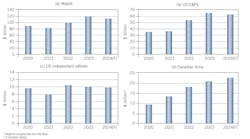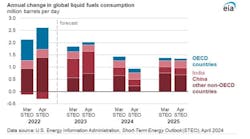By Maureen Lorenzetti
OGJ Online
HOUSTON, Oct. 1 -- The US Energy Information Administration warned Thursday the Midwest should expect higher diesel fuel prices this winter.
The prediction was the only negative news in the agency's annual winter fuels forecast.
EIA said, "This winter is expected to bring lower heating bills than those seen last winter. Assuming normal weather, winter heating bills for residential consumers could average from $170-$320 lower than last winter."
It said most industry trends are against higher prices. "Demand for heating fuel is expected to be lower than last winter, when the weather was about 7% colder than normal; inventories of key heating fuels, especially natural gas, are above normal levels for this time of year and substantially above those at the onset of last winter; and crude oil and natural gas prices are at lower levels than they were last year. In contrast to last winter, there is less concern about quantity constrains and the potential for extraordinary price fly ups among the major heating fuels this winter.
"This is particularly true for natural gas and propane, based on the ample preseason supplies that have been put in storage. Somewhat more risk may apply to distillate fuels, which still have inventory levels somewhat below average, particularly in the Midwest, where there are refinery outages."
The EIA forecast noted that world oil prices initially rose following the Sept. 11 terrorist attacks in the US and then fell sharply as the Organization of Petroleum Exporting Countries reassured the world market that it would maintain plentiful supplies, leaving the market to focus on world oil demand, which was weakening even before the crisis.
EIA said the average US imported crude price in September were $22/bbl, down $1.90/bbl from August, while the benchmark US light, sweet crudes averaged almost $26/bbl in September.
"In the near term, the largest impact on world oil demand is expected to come from the large drop in jet fuel. Worldwide jet fuel demand is estimated to have fallen by about 10% outside the US and as much as twice that in the US. In addition, revised economic estimates indicate that the US, viewed as the engine for global economic growth, may be in the midst of a recession."
EIA said those two factors prompted it to reduce its global oil demand projections for the fourth quarter by 700,000 b/d.
In 2002, EIA anticipates commercial jet fuel use will recover somewhat and that global jet fuel demand will be down by roughly 5%.
"Weaknesses in the world's economy are projected to reduce growth further, leaving OPEC to supply a world oil market that is smaller in 2002 than previously projected." It said demand growth in 2002 is projected at 900,000 b/d.
EIA projected a tight supply/demand balance in the Midwest.
"Distillate fuels, including diesel fuels and heating oil, are likely to be the most strongly affected, as refinery outages coinciding with peak fall demand, are expected to keep depleted inventories from recovering from seasonal average levels."
It said gasoline is less likely to be affected, "but the situation could erode by next spring, if distillate levels remain tight through the winter, taking away from potential gasoline supply."
The forecast said, "Like diesel fuel, gasoline prices usually run several cents lower than the national average in the Midwest. But this year they could run several cents higher than the forecast national average price of $1.41/gal. Last year the Midwest average was about $1.49/gal for the same period.
"Midwest diesel fuel could easily average 5-6¢ above its typical relationship to the US average, as it has during the May-June and August-September periods this year, or closer to $1.50/gal if no price spikes occur. Last year diesel fuel prices in the Midwest averaged $1.57 during the last 4 months of the year, mainly due to higher crude oil prices last year than are being forecast for this year.
"If the distillate supply-demand balance in the Midwest were not so tight, we could expect to see residential heating oil average about 7-8¢/gal lower than US prices. With US residential prices expected to average about $1.16/gal from September through December, the US would normally see prices below $1.10/gal."
EIA said, however, with the current tight balances, any demand spike could cause prices to jump.
Contact Maureen Lorenzetti at [email protected]

